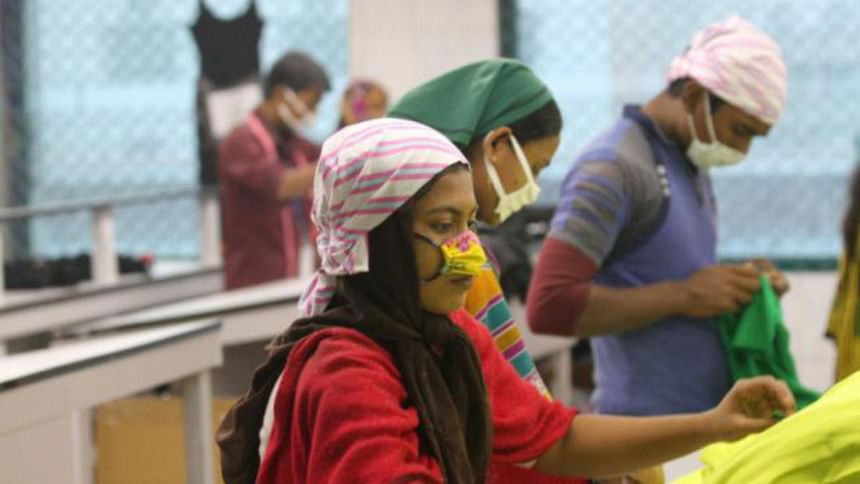Are we ready?

Shirin has been with us for 12 years, Mahmuda for nine, Rakib for six. The number of workers who have worked for us in one particular factory for over 10 years is massive. Most live in Khilkhet, where we have one of our factories. We are currently scheduled to shift to a new one in Banglabazar in Gazipur. This factory of ours has been in existence for the last 14 years. Small in scale, it was always easy to manage. But time has come to move it out of the existing space as in this factory, we will no more be able to manage and address our compliance issues.
While I was away, workers who have never made any noise suddenly started creating havoc, as soon as relocation notice was served to them. I had to call from London and was on speaker phone with them for an hour and was finally able to convince them to resume work.
This week was another experience. When I saw them after three whole months, there were no arguments; they just wanted to hear from me. When the plans were announced, not even one raised their voice and just accepted the inevitable: This factory was to close down soon and the production facility was to shift to the new location. Couple of resignations followed, but most decided to just go with it. It is my good fortune that our workers are who they are and I couldn't have asked for more.
Like ours, hundreds of factories are to relocate and hundreds would have to close down. The option of doing business in small facilities is over. Post-Rana Plaza, Accord and Alliance have made sure that there would be no business in Bangladesh unless security is ensured. The building will have to be structurally sound, the fire equipment in place (including fire detection and protection system) and electrical integrity foolproof. Bangladesh has benefitted from these rules. Most of us have complied and have been able to crawl to the next level in spite of acute financial difficulty, especially when margins have dipped further, questions on productivity have popped up and costs have been threatening.
All's good as long as we can sustain the progress. Question is, can we or can we not? Question is, will we be proactive, going forward? Answers are simple: We can't not sustain what we have achieved so far and going forward, prescriptions have to cease and we have to actively engage with what we have and make self-auditing mandatory.
2016–17 have been years filled with anticipation and activity. The sector had to sustain the blows of a looming GSP challenge, which included intense labour issues. On top of that, the industry had to convey to the world that we were serious about making it on our own. Thus, the formation of Remediation Coordination Council (RCC) was prompted by ILO, which is to overview and ensure progress of factory safety in conjunction with the local stakeholders. RMG Tripartite Consultative Committee (TCC) was also formed so that workers' woes could be taken care of. A revised draft of the labour law has been submitted and EPZ draft law was recalled from parliament—this behind-the-scenes list can go on.
After all that has happened, the readymade garment sector now happily faces the inevitable challenge of being weaned off the support that it has had. I add "happily" as no nation should ever be subjected to perennial surveillance. Point is, are we ready? Is there a mechanism set in place, which will help us to carry on the work that has been done? Or rather, will we be ready in the next six months when Accord and Alliance will complete their tenure and should be ready for an exit, without seeking any extension?
Out of Accord and Alliance, the latter has opted to leave and is looking for an exit plan, which will ensure a smooth transition benefitting the sector. Accord, on the other hand, hopes to leave only in case "adequate" progress has been made and enough has been done to ensure successful continuation of their good work, which has helped the industry enormously. What is the structure that will make sure that the interests of all the stakeholders will stay intact? How will we convince the brands and the unions that their interests in securing the safe production of their products will continue?
Simple. An effective transition practice has to take place with immediate effect so that January 2018 onward, an independent body begins functioning, in its own capacity, which would include all stakeholders including the ministry of commerce, ministry of labour and employment, brands, trade unions, manufacturers and the ILO. This independent body could overview the already existing RCC. All we need is a transparent system with suggestions from all sides on how to become a body free of influence and favour. An ombudsman could help solve the crisis along with the induction of a chief technical officer, who could ensure proper functioning of the whole remediation process. Alongside all this, both Accord and Alliance could also ensure their legacy by influencing the local stakeholders to continue what they had begun: health and safety committees, helplines, training et al.
It is in the best interest of all that we continue taking our own responsibility. A thriving sector supporting millions cannot be subjected to permanent monitoring. Neither can the business be threatened with suffering the consequences forever nor can the industry survive on measly, bare minimum promises. All sides need to step up and make sure that blame games don't mar the scenario and that unnecessary, undesired stakeholders' confrontation does not endanger the lives of the millions whose livelihood depends on a single industry that could crumble to the ground, only because we weren't quick enough to notice and make amends. Stalling to form an immediate consensus and a specific format of the next body should not be allowed. Slacking must cease. Progress should be visible and progress must be acknowledged.
Rubana Huq is the managing director of Mohammadi Group.





Comments